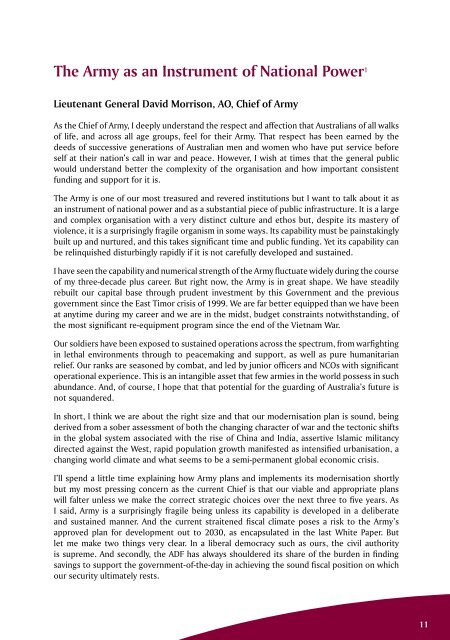190%202013%20Mar_Apr
190%202013%20Mar_Apr
190%202013%20Mar_Apr
You also want an ePaper? Increase the reach of your titles
YUMPU automatically turns print PDFs into web optimized ePapers that Google loves.
The Army as an Instrument of National Power 1<br />
Lieutenant General David Morrison, AO, Chief of Army<br />
As the Chief of Army, I deeply understand the respect and affection that Australians of all walks<br />
of life, and across all age groups, feel for their Army. That respect has been earned by the<br />
deeds of successive generations of Australian men and women who have put service before<br />
self at their nation’s call in war and peace. However, I wish at times that the general public<br />
would understand better the complexity of the organisation and how important consistent<br />
funding and support for it is.<br />
The Army is one of our most treasured and revered institutions but I want to talk about it as<br />
an instrument of national power and as a substantial piece of public infrastructure. It is a large<br />
and complex organisation with a very distinct culture and ethos but, despite its mastery of<br />
violence, it is a surprisingly fragile organism in some ways. Its capability must be painstakingly<br />
built up and nurtured, and this takes significant time and public funding. Yet its capability can<br />
be relinquished disturbingly rapidly if it is not carefully developed and sustained.<br />
I have seen the capability and numerical strength of the Army fluctuate widely during the course<br />
of my three-decade plus career. But right now, the Army is in great shape. We have steadily<br />
rebuilt our capital base through prudent investment by this Government and the previous<br />
government since the East Timor crisis of 1999. We are far better equipped than we have been<br />
at anytime during my career and we are in the midst, budget constraints notwithstanding, of<br />
the most significant re-equipment program since the end of the Vietnam War.<br />
Our soldiers have been exposed to sustained operations across the spectrum, from warfighting<br />
in lethal environments through to peacemaking and support, as well as pure humanitarian<br />
relief. Our ranks are seasoned by combat, and led by junior officers and NCOs with significant<br />
operational experience. This is an intangible asset that few armies in the world possess in such<br />
abundance. And, of course, I hope that that potential for the guarding of Australia’s future is<br />
not squandered.<br />
In short, I think we are about the right size and that our modernisation plan is sound, being<br />
derived from a sober assessment of both the changing character of war and the tectonic shifts<br />
in the global system associated with the rise of China and India, assertive Islamic militancy<br />
directed against the West, rapid population growth manifested as intensified urbanisation, a<br />
changing world climate and what seems to be a semi-permanent global economic crisis.<br />
I’ll spend a little time explaining how Army plans and implements its modernisation shortly<br />
but my most pressing concern as the current Chief is that our viable and appropriate plans<br />
will falter unless we make the correct strategic choices over the next three to five years. As<br />
I said, Army is a surprisingly fragile being unless its capability is developed in a deliberate<br />
and sustained manner. And the current straitened fiscal climate poses a risk to the Army’s<br />
approved plan for development out to 2030, as encapsulated in the last White Paper. But<br />
let me make two things very clear. In a liberal democracy such as ours, the civil authority<br />
is supreme. And secondly, the ADF has always shouldered its share of the burden in finding<br />
savings to support the government-of-the-day in achieving the sound fiscal position on which<br />
our security ultimately rests.<br />
11


